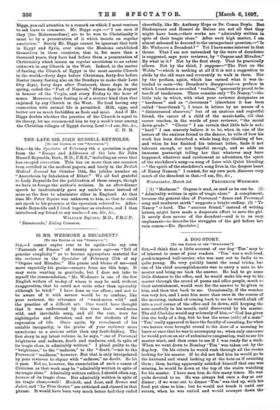IS MR. WEDMORE A DECADENT?
[To THE EDITOR OF THE "SPECTATOR.']
SIR,—I cannot aspire ever to be again—like my own " Pastorals of France " of twenty years ago—so " full of genuine simplicity" as to become appropriate material for the reviewer in the Spectator of February .27th of my " Orgeas and Miradou." His praise and blame of me—and more especially his praise—remove from me this hope. It may seem wanting in gratitude, but I dare not take to myself the commendation, " Mr. Wedmore is one of the few English writers of to-day of whom it may be said, without exaggeration, that he could not write other than agreeably although he tried." I have done so too often ; and not to be aware of it with sorrow would be to confuse, like your reviewer, the utterance of " wood-notes wild " and the practice of a difficult art. One would have thought that it was understood by this time that wood-notes wild, and inevitable song, and all the rest, were for nightingales and thrushes, and not for students of the expression of life. Once again, by revealment of his amiable incapacity, is the praise of your reviewer more unwelcome to a serious artist than any fault-finding. The first story in my latest volume is, he says, " one of Provencal brightness and sadness, death and madness, and, in spite of its tragic close, is admirably written." I plead guilty to the " brightness," to the " sadness," to the " death,"—not to the Provencal " madness," however. But that is only interpolated by your reviewer to rhyme with " sadness," no doubt. So let it pass. Not so, however, the enunciation of such a canon of Criticism as that work may be " admirably written in spite of its tragic close." Admirably written rather, I should often say, because of its tragic close. But admirably written in spite of its tragic close,—well ! Macbeth, and Lear, and Borneo and Juliet, and " Le Pere Goriot" are criticised and classed in that phrase. It would have been very much better bad they ended cheerfully, like Mr. Anthony Hope or Dr. Conan Doyle. But, Shakespeare and Honore de Balzac are not all that they might have been,—their works are " admirably written in spite of their tragic close." After such high matter, I am almost ashamed to descend to the unimportant question,—" Is Mr. Wedmore a Decadent ? " Yet I have some interest in that theme. That I am not untouched by the wave of decadence is suggested, says your reviewer, by " Orgeas and Miradou." By what in it ? Not by the first story. That he practically allows. Not by the third, I suppose—" The Poet on the Wolds "—which is nothing at all if it is not a suggestion to abide by the old ways and reverently to walk in them. Not by the preface, again, which has earned what it was in- tended to earn—the Decadent's disapproval—a preface in which I condemn a so-called "realism," ignorantly proud to be bereft of tenderness. There remains only "To Nancy,"—the" little tale in which, with what your reviewer designates as " hardness " and as " cleverness " (elsewhere it has been called " heartbreak "), I trace in letters by no means of a " disinterested observer," but of an anxious and regretful friend, the career of a child of the music-halls, till that career reaches, in the words of your reviewer, " the moral down-grade." " Clever " I am certain that little tale is not; " hard " I can scarcely believe it to be, when in one of the letters of the anxious friend to the dancer, he tells of how his work has been disturbed a whole long day, thinking of her, and when he has finished his tolerant letter, finds it not tolerant enough, or not hopeful enough, and so adds an immense postscript telling her that whatever may have happened, whatever mad excitement or adventure, the spirit of the stockdove's song—a song of Love with Quiet blending. —" the spirit of the stockdove's song lives in the deepest heart of Nancy Nanson." I cannot, for my own part, discover very much of the decadent in that.—I am, Sir, &c., [ (1) "Madness." Orgeas is mad, as mad as he can be. (2). "Admirably written in spite of tragic close." A compliment, because the general idea of Provencal " dance and Provencal, song and sunburnt mirth" suggests a bright ending. (3) " To Nancy" is hard. The "anxious friend," instead of writing, letters, might have made a desperate effort to save the girl. It surely does savour of the decadent—and is to us very. unpleasant—to describe the struggles of the girl before her ruin comes.—ED. Spectator.]






































 Previous page
Previous page